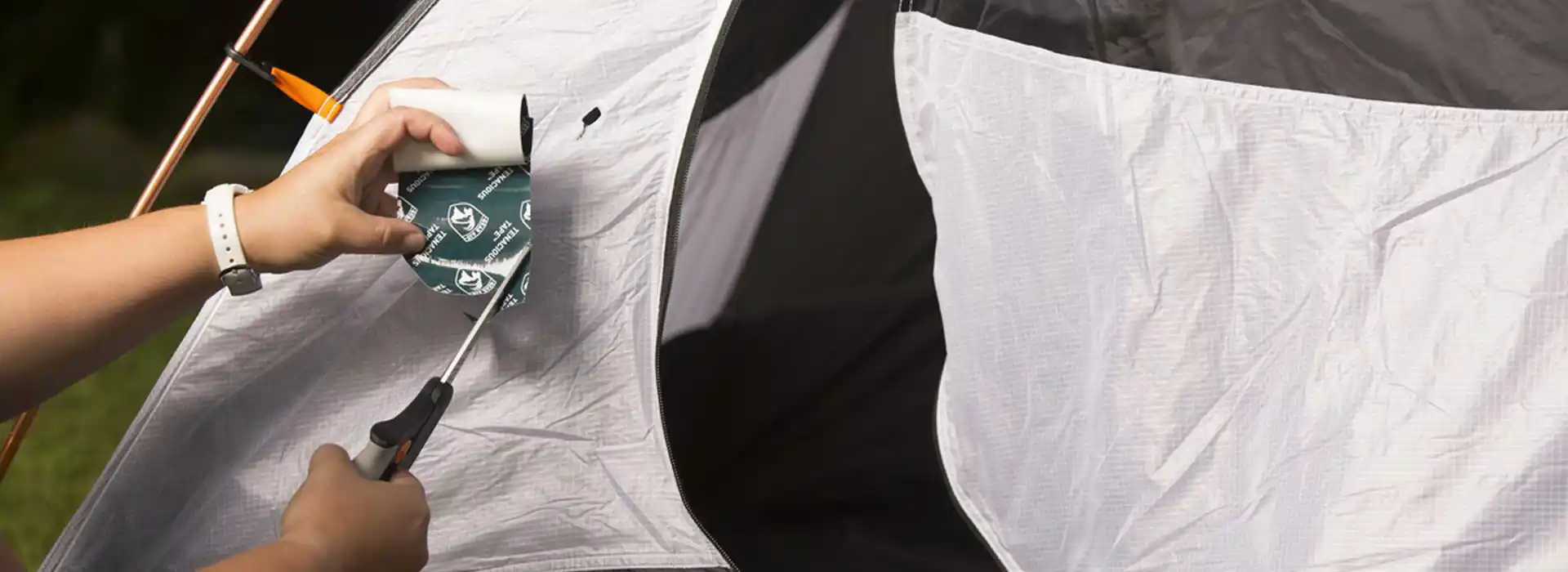Just like any major investment in your life, sometimes the worst happens and it gets damaged. The good news is that there are plenty of ways to mend the odd snag here and there, so you can breathe new life into your home from home. Here you'll find all the tips, tricks and info that you'll need to keep your tent going for years to come.
What's the best way to repair a rip?
For sewing up rips and tears you can put together a small tent repair kit, containing heavy duty needles (leather/sailmaker's needles, that is), a thimble, lightweight work gloves, a small pair of pliers and the right thread.
For canvas tents, you can sew up a small rip at home with nylon cotton, button thread or any type of extra strong cotton from a haberdasher and a squirt of Fabsil for proofing or seam sealant over the repair.
For a synthetic tent, a strong polyester thread such as Gutermann's thread will allow the seam to have a little give in it.
Also don't forget to carry tent repair tape with you, a lightweight tape that is waterproof and will stick almost anywhere on the tent for a quick fix and temporary seal until you can give it a proper going over. You’ll see it sold sometimes under the brand name Tenacious Tape. For an extremely sturdy fix, round off the Tenacious Tape with scissors and put it on the top side of the rip, then apply some super strength Gorilla Tape underneath in the same spot – it’ll be double strength.
What if it’s too much for a DIY and I need a professional tent repair?
Scottish Mountain Gear can be booked online or by phone to rescue your camping gear. They specialise in tent zipper repairs, patching and even re-sewing seams.
What about repairing tent poles?
When the problem's bigger than just fabric, there’s a lot that can be done for the ‘bones’ of your tent too. First, think ahead and carry a set of spare tent poles, as a handy back up.
Pair that with buying a tent pole repair kit including items such as shock cord, ferrules, washers and more, which you can buy online.
If you buy unthreaded poles, you’ll need to tension them yourself. Basically, hold the elastic pulled tight by the section to replace, cut it and ask a fellow camping fanatic to hold it in place while you rethread from the other end. Finally, tie the elastic together again.
For repairs to pole and other non-fabric tent areas, try FORMcard or Sugru, which are both mouldable glues perfect for DIY projects.
Where can I get spare parts for my tent?
You’re more likely to be able to find parts for a newer tent or one bought from a big brand. A great place to start your search is at tentspares.co.uk or by calling the manufacturer of your model.
How do you handle a puncture in an inflatable tent?
You can buy spare air beams, and the tent is likely to come with a puncture kit for a quickie fix. Just patch and re-inflate, it doesn’t need to put too much of a damper on your holiday.
How can I avoid wind damage to my tent?
Rips, tears and broken poles can all happen in strong winds, unfortunately. Avoiding them is, firstly, about choosing the right pitch and checking the forecast ahead.
After that, pitching and taking down the tent are the most vulnerable times, so ideally wait until the wind calms or use a wind break while you do that. Choose pegs carefully to suit the ground you’re faced with and use all the guy lines you have for your best chance of beating mother nature.
Try to balance tension on the guy ropes around all the guys so that the tent won’t easily be blown in one direction. You can also weigh down the tent corners with sandbags - that should keep everything solidly on the ground!
Your comments about this article
Alan
21/04/2019 21:15I was trying to find a site where I can take a tourer onto a site and leave it there. I would hope they would store it over winter and over the season I could just go to it as and when I wanted to. I am willing to pay an annual site fee to include electric and gas. Can you advise as I am a novice in this area
Martin Smith
22/04/2019 09:01Have a look at our listings of 250+ sites offering seasonal pitches Alan :-)
- Why go camping?
- Camping statistics
- How to plan a camping trip
- Equipment and gear: what to take camping
- How to choose a campsite
- Camping etiquette and campsite rules
- Choosing a pitch and setting up camp
- Breaking camp
- How to keep warm when camping
- How to avoid midges, wasps and other insects while camping
- Camping with dogs
- Camping with campfires
- Camping tips, hacks and tricks
- Beware carbon monoxide poisoning
Download our list of everything of you need to remember for the perfect camping trip!
DownloadIn the UK, you don't have to travel far to see some amazing sights.
We're lucky enough to have world-besting landscapes, history and wildlife right on our doorstep.
Where will you explore next?
Explore Destinations